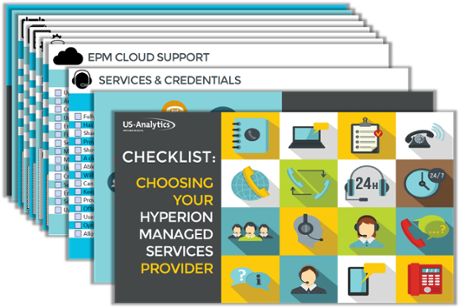Not having to deal with infrastructure is probably a huge reason for your organization moving to the Oracle EPM cloud. You no longer have to worry about supporting hardware for mission-critical EPM systems. You have a daily maintenance window where updates occur and defects are fixed. Life just got easier for you, and you’re on cloud nine (pun intended).
Before you plan your dream vacation with this newfound freedom, check your to-do list for the maintenance activities that still need to be completed. You’ll see a number of tasks that are tedious, highly specialized, and for the most part, routine — meaning they are perfect for outsourcing to Hyperion experts.
Here they are…
Metadata Management
Businesses naturally ebb and flow, which is why you’ll need to manage your metadata accordingly to reflect your business and reporting needs. To ensure everything runs smoothly and is consistent with your business needs, you’ll need your hierarchies updated regularly. Whether you’re adding new accounts, creating alternate hierarchies, or updating member formulas, a managed services team will maintain your metadata — allowing your team to focus on strategic reporting.
Data Management Issues
The Oracle EPM Cloud uses Data Management to integrate your data from an ERP system to your EPM target application. You’re also able to drill through from your EPM application and view the data in your ERP source system.
Like most things, Data Management isn’t as simple as it sounds. Though you can use it with every EPM Cloud application, there are notable differences between how it works in each application and how it works in the cloud vs. the corresponding on-prem version.
There are also many tasks that need to occur within Data Management, like administration and security tasks as well as setting up your source systems. A managed services provider can ensure that everything is set up properly and, if something goes wrong with your data load, fix it quickly and efficiently.
Security Management
Setting up security for your users is still an essential task in the cloud. As we’ve said in past blog posts, there are a lot of things that can go wrong. You’ll need someone to manage your groups and security settings for your users. To understand the complications that occur with security, check out our worst practices blog post.
Improved Communication
If you need it, Oracle is there to answer Service Requests when things go wrong with your cloud application. But Oracle also has a lot of other customers and their help desk won't have an intimate knowledge of your custom environment. You also now have the option to submit a "Technical" or "Non-Technical" Service Request (SR).
If you choose "Non-Technical," you might get response saying something to the effect of "this is a Technical issue please submit a new SR," or vice versa. This seems like a great idea in theory, but can create a few issues, including...
- A request getting bounced back in forth between two portals
- The technical team asking questions about your issue that a functional user might not understand
- The inability for a user to obtain pertinent information that the technical team needs to complete your SR
- The Help Desk focusing more on the technical side of things when you're looking for functional help.
Communication with a (great) Support Team should be simple and streamlined — they know your environment, they know what kind of user you are. Your support dream team will have a group dedicated to supporting you when any issues arise — they know that you need help fast so you can complete your integral tasks.
Other Activities
There are too many activities to cover them all thoroughly in one blog post. Other tasks include:
- Update business rules
- Create and maintain workflows
- Set up, open, and close business processes
- Provide end user support
- Ensure data accuracy among applications
- Script backups to be archived off cloud (currently, nightly backups are not saved indefinitely)
- Update admin guides and process documentation
Being in the cloud does take infrastructure tasks off your plate, but you still need a support plan for application support, business processes, automation, and end user support.
Outsourcing this work will allow your team to get back to business… and you can pack your bags for that dream vacation.





